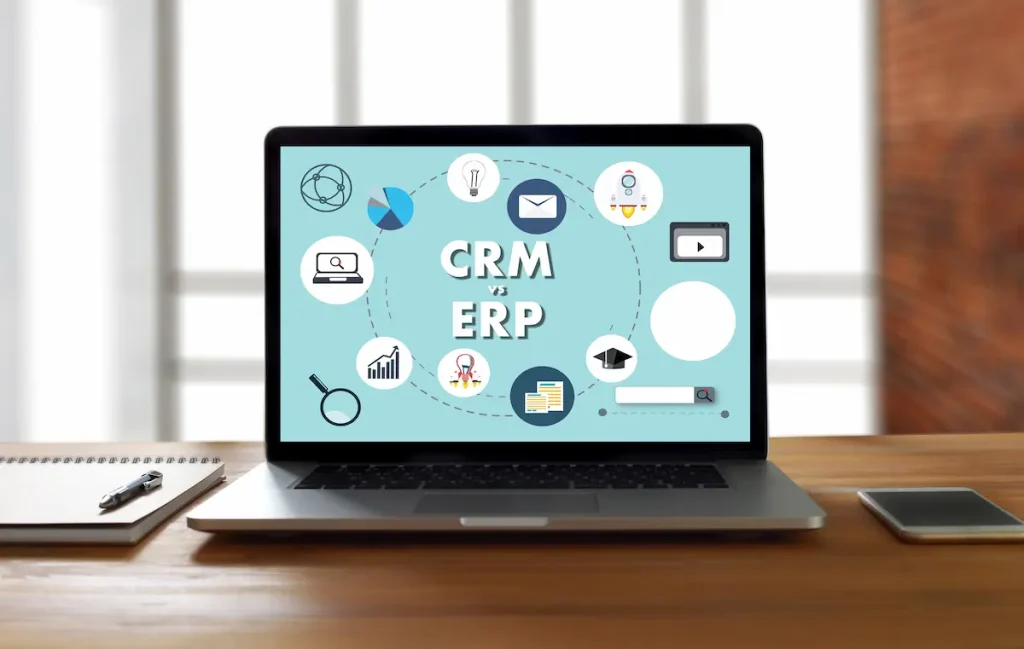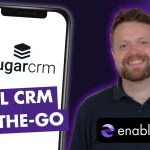CRM vs ERP - The Key Differences
Growing a business, regardless of size, requires a huge amount of time, resources and organisation. Implementing new and updated processes as time moves demonstrates good health as it shows the business can adapt as it scales.
This scalable growth is possible using traditional means, but the rapid advancement of business systems in the form of Customer Relationship Management (CRM) and Enterprise Resource Planning (ERP) software has removed many of the pitfalls that are associated with manually managing sales and leads, and backend process planning respectively.
In this article, we’ll break down what is similar, what’s different, and why both of them should be considerations for your businesses day-to-day use.
What is CRM?

Naturally, you may be wondering what each of these are, or why your business even needs them. In reality, at a core level, you already use both if you run a business. We’ll explain this later on.
But firstly, CRMs are systems that you use for managing many of the activities that are part of the sales and marketing process. Its key function is to support these activities by acting as a central place to store all communications between you and your customers.
Conversations between sales and customer service teams, and their leads can all be stored in a CRM.
It also keeps information that is useful for marketing activities to both prospects and existing clients, and automatically updates when a customer notifies a change in preferences. This is great for ensuring that you are marketing the right products to the right people.
These elements work together to help drive growth through good communications that increase customer satisfaction, and result in loyal, frequent buyers.
What is ERP?
Meanwhile, ERP systems are to backend staff what CRMs are to salespeople. It acts as a central location that will store and assist in enacting all internal processes for a company, while also maintaining communications in relation to them across the business.
ERPs are more commonly used by staff who manage and enforce background processes, such HR, administrators, finance, supply chain and production.
Fundamentally, both CRM and ERP are systems that assist in the functioning of a business on the front and backend respectively. These are business systems as opposed to software, so while you may not use a bespoke software for either function, if you run your own business, you will have something in place for both of these even if it’s kept in your head rather than a strict written guideline.

What are the key differences?
CRM and ERP are commonly talked about in the same breath as they both perform functions that are important for the smooth running of modern business.
However, they both operate autonomously within a business, and are designed to be used and assist with the needs of different departments.
Think of it as a restaurant. The CRM is represented by the host, waiting staff and their tills for taking orders. These are at the heart of the experience for the customer. Not only do they confirm pricing of an order, but they must be mindful to create a clear communications channel with the customer to ensure a high quality experience.
This could include noting down any dietary requirements such as allergy and intolerance requests, how well they want a steak cooked, recommendations from staff based on their preference in instances such as wine selection, and anything else that will improve the experience.
With a great experience, the front of house can turn the customer into a regular, and make adjustments to better the experience in future, or improve marketing avenues with word of mouth or email discounts and rewards.
Meanwhile, an ERP is the chefs in the kitchen and any extra admin staff. While they make the food for paying customers, they also represent the backend of the restaurant that helps the business to operate by ensuring that going from order to delivery is a smooth process.
The head chef may also work with the office manager to explore opportunities for efficiency and better use of resources in the kitchen, either to deliver a better service for the customer or to make the best use of budgets. This includes processes that the front of house also adheres to, but contributes to the overall success of business.
As with the example, both a CRM and ERP are part of the same business, but functionally focus in different areas. CRM creates a user experience as good as possible to provide a positive customer experience, while an ERP assesses and improves the internal workings that will ensure the business continues to function efficiently.
How are they similar?
While they both operate separately from each other, a CRM and ERP system have plenty in common and often work best in tandem.
Communication is a key component of both systems. The storing and usage of notes and conversations with stakeholders bring the most value to any component of business.
Both a CRM and ERP, especially in the instance of business software, are excellent for acting as a single source of information. With everything fed into either one of the two systems, they will effectively and efficiently create a resource that helps you understand everything you need to know for their intended uses.
In a CRM, it’s conversations and details with clients and preferences for marketing purposes. This can include admin and invoicing documentation.
In ERP, it’s the internal processes relating to anything that isn’t specifically related to a customer. An example here is production and pipeline process documentation.
Both systems also excel at automation of manual processes. This typically includes generating common documentation, setting up alerts to review processes, or scheduling regular contact and meetings across the company.
They also integrate with other software (including each other) to expand functionality and remove silos across an organisation. This maintains that single source of information from the CRM or ERP across your entire technology stack.

Do I need both CRM and ERP software systems?
Robust, well-implemented CRM and ERP systems are essential for the prosperity of business in the long term. However, they are also systems that typically require a big investment to introduce to a business. The value each brings increases as more people are introduced and processes grow in complexity.
With that in mind, the answer to this question is one that only you, as a business owner, will know the answer to.
However, it’s worth noting that while each one specialises in different areas, both CRM and ERP software possess crossover, and can do the job of the other, albeit at a simplified level.
For example, the suite of products from enable’s service partner SugarCRM is firmly in one camp, but the flexibility of the product will introduce everything you need in a CRM with features that can provide functionality usually seen in an ERP system.
This includes managing many background processes that are not specific to the customer element, such as administrative automations.
Aside from a few exceptions, such as in a manufacturing or fintech business, the major benefits of an ERP system become stronger as your operations expand. When starting out or as a SMB, processes tend to be simpler, and easier to manage.
CRMs offer more immediate benefits as any business isn’t really a business without sales.
A report on CRM by DemandSage states that using an integrated CRM can increase conversation rates by as much as 300%, and that 47% of companies saw a rise in customer retention rate, as well as productivity improvements.
The benefits come as the source of your income, so it’s one of the first considerations you should make for improving your business. As it also flexibility covers the basics of an ERP system, the recommendation is to start with a CRM.
Then, as your business grows and more stakeholders are introduced, consider implementing a dedicated ERP platform to compliment your existing CRM software.
If you’ve decided that a good CRM is what you need, but are unsure where to start, or perhaps you have an ERP system and want to expand on its CRM functionality with a dedicated system, we at enable have built CRM systems for the last 25 years and offer a number of options to get your business where you want it to be. Click here to book a meeting with our team and start your journey to better business growth.




